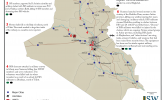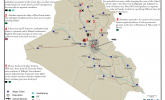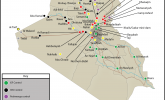Iraq Situation Report: August 2, 2014
August 2, 2014 -
Clashes between ISIS and Peshmerga forces in Zammar and Jalula indicate an attempt by ISIS to secure the areas that it is contesting against Kurdish troops.

Clashes between ISIS and Peshmerga forces in Zammar and Jalula indicate an attempt by ISIS to secure the areas that it is contesting against Kurdish troops.

ISIS continues to attack the Baiji oil refinery with the intent to complete its control of Baiji city.

By Charles C. Caris & Samuel Reynolds
The Islamic State’s June 2014 announcement of a “caliphate” is not empty rhetoric. In fact, the idea of the caliphate that rests within a controlled territory is a core part of ISIS’s political vision. The ISIS grand strategy to realize this vision involves first establishing control of terrain through military conquest and then reinforcing this control through governance. This grand strategy proceeds in phases that have been laid out by ISIS itself in its publications, and elaborates a vision that it hopes will attract both fighters and citizens to its nascent state. The declaration of a caliphate in Iraq and Syria, however, raises the question: can ISIS govern?

Although ISIS has had experience in governing urban centers in Syria and Iraq before, the City of Mosul is the largest and most developed area now under ISIS control now.

by Jessica D. Lewis
Many have asked what needs to be done about the Islamic State of Iraq and al-Sham (ISIS), the terrorist organization that recently took control of Mosul, Iraq’s second largest city. Questions range from the acceptability of airstrikes and the viability of a national unity government in Iraq to the feasibility of a counter-offensive that depends upon the remaining capacity of the Iraq Security Forces. These are important and worthy questions, and timely, because ISIS is growing stronger. But these questions preempt the rigorous analysis that is required in order to determine what the U.S. should do about ISIS and why.

ISIS is aiming to establish normalcy in areas where it has control in Iraq. Hosting fairs and Eid celebrations represents an attempt to show the “friendly” side of ISIS, publicizing recreational activities rather than an oppressive state.

ISIS continued to challenge the Peshmerga near Sinjar, although these are not major operations and do not demonstrate a desire to control Sinjar.

On June 24, ISW assessed that the area of Udhaim was cleared by the ISF and Iraqi Shi’a militias. On July 28, however, the Defense Ministry announced the start of an operation that has thus far cleared three villages and remains ongoing. The operation appears to be prompted by an increasing number of clashes and IEDs emplaced in the city, which indicates a level of ISIS access to the area that challenges full ISF control. ISW is therefore changing the status of Udhaim from ISF controlled to contested.

The Taliban’s annual summer offensive in Afghanistan in 2014 can be characterized by waves of violence across the country and, in particular, a string of attacks ringing the capital, Kabul. The attacks appear mainly to target Afghanistan’s infrastructure, particularly its airports. Although the Taliban attempted to focus its efforts in June on the 2014 presidential election runoff, it was unsuccessful in derailing the elections or disrupting them to a notable degree. That period of concentrated effort lasted less than two weeks.

Reports that ISIS is sending reinforcements to the vicinity of the Hamrin Dam indicate that ISIS is seeking to control the dam as a military objective rather than pursuing it as a feint to divert ISF resources away from other targets.